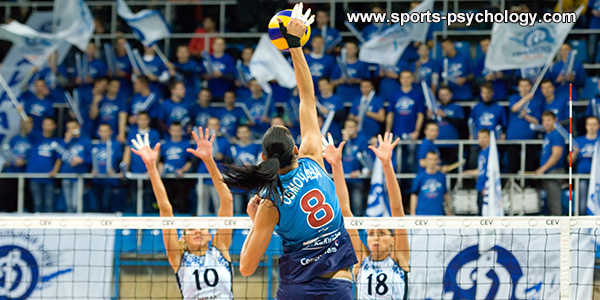
Volleyball Players Who Dwell on Mistakes
Summary: Elite volleyball performance depends on mastering a one-point-at-a-time mindset. Dwelling on past mistakes or worrying about future outcomes leads to frustration, loss of confidence, and inconsistent play. Volleyball players—especially setters and liberos who touch the ball the most—must learn to let go of errors and stay present.
As a former player and coach, I’ve been around many elite volleyball players and their game.
I’ve played with and coached players who were able to let go of mistakes or distractions and were the model of a “one-point-at-a-time” mindset.
In contrast, I’ve been with athletes who either focused too much on the past or future, or both…
They continued to think about their first missed serve, double, or net violation. Or, they might have maintained an outcome focus; focusing on winning or losing and what happens with each scenario.
I coached a setter one club season, and she was good. She consistently outperformed the second setter on the team. This player also ended playing for a D1 in North Carolina; just talented.
During this particular club season, she received two “double” calls within the first two days of a three-day tournament. Doubles were uncommon for this setter and she didn’t know what was going on. Honestly, both of the sets looked clean.
The third day was Championship Sunday and our team was playing for Gold…
This setter, who was our first setter lost her composure in the first set of the first match. She got called for another double.
As we went into the second set, she said she couldn’t do it and the other setter had to set. This player wasn’t able to let go of those calls. Therefore, she struggled to move on and continue playing in the present.
A volleyball player touches the ball countless times during a match.
A libero, for example, is going to pass the ball the majority of times it comes over the net. The setter is going to touch the ball around 98% of the time her team has possession, as they have every second ball.
Volleyball is a “one-point-at-a-time” game, and success comes when that is how it’s played.
It’s Easy to Say “Play One Point at a Time,” Right?
Though, when it’s all said and done, more is said than done.
HOW do you let go of errors?
CAN you play in the present?
HOW do you play one point at a time?
One strategy to direct your focus and help you develop a one-point-at-a-time mindset is to use performance cues.
Performance cues are relevant to your specific tasks, such as serving, serve receive, blocking, setting, attacking, and so forth.
A performance cue for a setter may be something like, “Feet under the ball,” “Hold your finish,” “Know your hitter options,” etc.
You want to develop one or two performance cues that are relevant to your specific role on the court.
Use these cues after an error, another distraction, or as a strategy to guide your game plan. These will help in letting go of mistakes and upholding a present focus.
Remember, you don’t play your best when you dwell on the past or think too far into the future.
You physically play in the present and you maintain an advantage when your mental and physical game connect.
If you need help with your mental game, please contact us for the options today.
5 SEO-Rich Tips for Developing a One-Point-at-a-Time Mindset in Volleyball
1. Focus on the Present Play
Volleyball is a “one-point-at-a-time” game. Dwelling on past mistakes or worrying about future outcomes only takes you out of rhythm.
2. Use Performance Cues
Short, task-focused reminders like “feet under the ball” or “hold your finish” can refocus attention after errors and guide consistent execution.
3. Reset After Mistakes Quickly
Errors are inevitable. The key is how fast you recover. Refocusing immediately after a missed serve or call keeps momentum on your side.
4. Train Mental Resilience in Practice
Treat practice like competition—use performance cues, reset strategies, and mental routines so they become second nature in matches.
5. Connect Mental and Physical Play
Your physical skills only shine when your mindset supports them. Playing in the present connects mind and body, giving you a competitive edge.
Written By: Dr. Megan Melchiorre
Related Sports Psychology Articles:
- Mental Toughness for Sports: Grinding it Out
- Your Mental Toughness and Returning From an Injury
- Using Adversity to Improve Mental Toughness
Free Mental Toughness Reports

Get instant access to a mental game report to improve your mental toughness. Are you making one or more of these “deadly” mental game mistakes prior to competition? You can improve your mental game with one of our free sports-specific reports below.
with our free mental toughness reports, you’ll:
- Discover if you have positive or negative pregame jitters.
- Identify your pre-competition mental game mistakes.
- Learn the important pregame mental skills to boost your performance and success!
Learn how mental game strategies can boost your mental toughness in sports with Dr. Cohn’s free mental game reports!
FAQ: Volleyball Mindset and the One-Point-at-a-Time Approach
Q: What does “one-point-at-a-time” mean in volleyball?
A: It means focusing only on the current play instead of dwelling on past mistakes or worrying about the outcome of the match.
Q: Why do volleyball players struggle to let go of mistakes?
A: Many athletes replay errors in their minds or fear repeating them, which distracts from staying present and performing at their best.
Q: How can performance cues help volleyball players?
A: Performance cues are short, focused reminders tied to specific skills (like setting, serving, or blocking) that help athletes reset after mistakes and direct their attention to the present task.
Q: Can a positive mindset really change game performance?
A: Yes—players who maintain a present focus recover quicker from errors, stay confident, and perform consistently under pressure.
Q: What are examples of performance cues for setters?
A: “Feet under the ball,” “hold your finish,” or “know your hitter options” are common cues that keep setters locked in on execution.
Q: How does the mental game connect with physical performance?
A: When athletes keep their minds in the present, their physical skills flow naturally, leading to better decisions, cleaner execution, and higher-level play.
Dr. Patrick Cohn is an expert mental performance coach who has helped athletes for over 30 years enhance their performance. Dr. Cohn earned a master’s degree in sports psychology from CSUF and a Ph.D. from the University of Virginia, specializing in Applied Sports Psychology.
